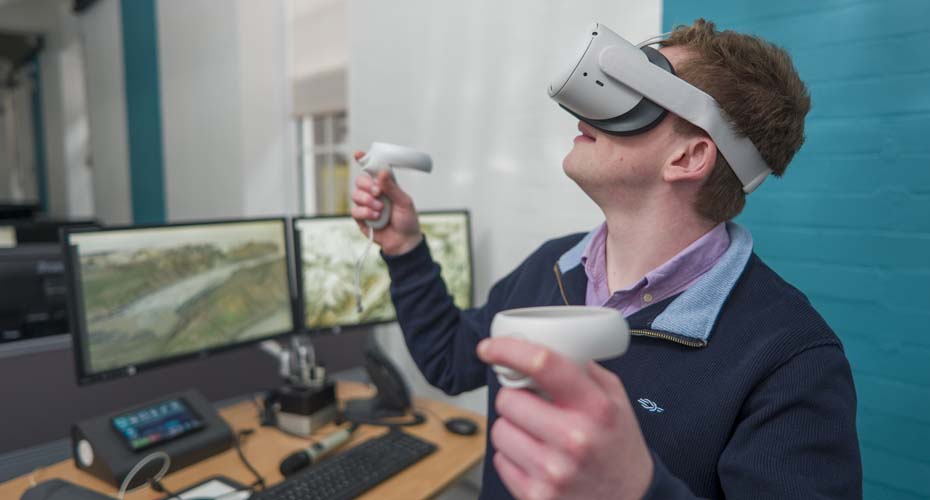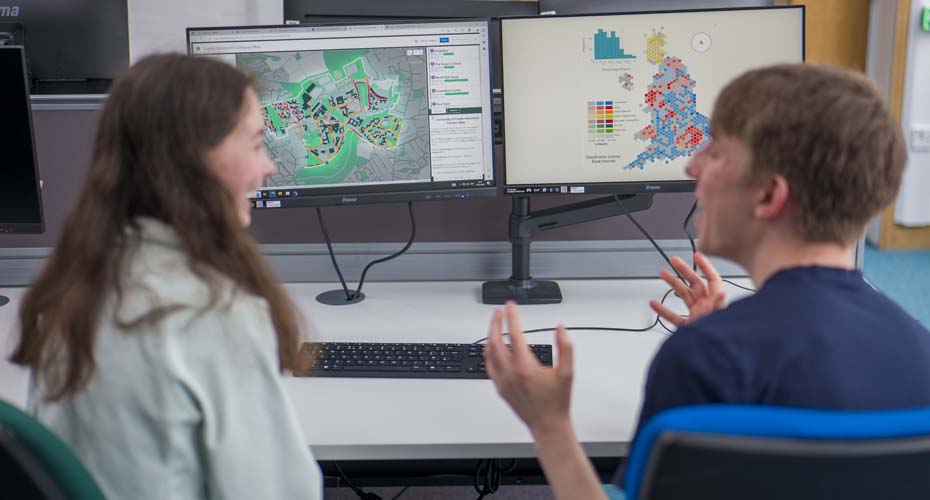| UCAS code | 1234 |
|---|---|
| Duration | 1 year full time, 2 years part time |
| Entry year | 2025 |
| Campus | Streatham Campus |
| Discipline | Geography |
| Contact |
| Typical offer | 2:1 degree |
|---|---|
Overview
- Geographical Information Science (GIScience) in application has the potential to change the world. From agriculture, climate change and ecology through to weather, utilities and transportation, there are hundreds of applications of GI Science and a myriad of benefits to society.
- Geospatial data is used to solve problems in all sorts of For example, satellite imagery can be used to observe iceberg formation and understand glacial processes; weather information can be used to help filter claims for insurance companies; traffic flow information can be used to improve ambulance response times; geovisualisations can be used to create 3D views of locations and drone footage can be used to manage forests.
- Join our MSc Geographical Information Science to learn the entire workflow of geospatial data – from data collection, analysis and modelling through to mapping, generating predictions and validating your findings
- Our carefully designed programme means that whether you have a background in geography or are new to it and looking to change paths, you will find the programme challenging and rewarding
- We enable you to develop practical skills such as coding, drone analysis, remote sensing workflows and geo-visualisations, as well as key employability skills such as group work, communication, and presentation
- Our location in the beautiful South West enables us to provide field trips to unique sites such as Dartmoor National Park and engage with partners such as the Environment Agency and Treeconomics
- You can tailor your degree to your career aspirations by undertaking an applied project which can be either research-led or consultancy focused
- You will graduate into the Exeter Geographic Information Systems (GIS) network made up of 300 GIS professionals in diverse roles at various organisations (find out more in the careers section) and be equipped to pursue careers in the spatial information industry, national and local government, consultancies, utilities and research organisations
![]()
Top 40 in the world for Geography
QS World University Subject Rankings 2025
![]()
Top 15 for Geography and Environmental Science
11th in the Complete University Guide 2025
![]()
6th in the UK for world-leading research in Geography and Environmental Studies
Based on 4* research in the Research Excellence Framework 2021
![]()
1st in the UK for Climate Action
![]()
Top 40 in the world for Geography
QS World University Subject Rankings 2025
![]()
Top 15 for Geography and Environmental Science
11th in the Complete University Guide 2025
![]()
6th in the UK for world-leading research in Geography and Environmental Studies
Based on 4* research in the Research Excellence Framework 2021
Entry requirements
A 2:1 degree.
An understanding of potential applications of geographic information systems (GIS) is all that is required as students take a core module in their first term covering fundamentals, such as cartographic principles, web maps, responsible mapping, data file management and introduction to coding. This serves as a recap for those with existing knowledge but offers thought provoking challenges through the bespoke content design of this course
Applicants with workplace experience will be considered on an individual basis.
Entry requirements for international students
English language requirements
International students need to show they have the required level of English language to study this course. The required test scores for this course fall under Profile B2. Please visit our English language requirements page to view the required test scores and equivalencies from your country.
The MSc Geographical Information Science provided an incredible insight in the availability and value of geographic information systems (GIS) data and their ability to transform every day information into intuitive visualisations and analysis to better inform decision making processes.
Having no background in Geography prior to my admission, the course content, coupled with the knowledgeable and enthusiastic faculty, provided a well-staged delivery of topics to ensure the building of foundation concepts throughout. This allowed me to easily grasp more complex topics along the way, aided by exceptional academic and pastoral support.
Having attended the course as a mature student on a scholarship from the Royal Air Force, I have since been able to apply this knowledge and skillset to a number of interesting projects. One of these is the development of a federated digital twin environment that provides exact digital replicas of MOD sites, enable more efficient, sustainable use of site assets and enhancing the pace and potency of top-level decision-making processes.
I would entirely recommend this course and the skillsets it provides. I have already been exposed to a wealth of exciting job roles and academic possibilities both during and after the course. The facilities and environment provided at the University of Exeter couldn't have been more conducive to allowing me to successfully navigate my journey back into higher education and provide a wonderful backdrop to the course.
Stephen
MSc Geographical Information Science graduate
Course content
Geographic information systems (GIS) and remote sensing tools are the technologies at the heart of this multi-disciplinary science which is transforming the way data is collected, the research we undertake, the networks we reach, the way we communicate through geo-apps and the decisions that we make as individuals and organisations.
You will empower digital transformation through GIS and discover how it is being applied in a growing sector crossing all industries including business, government, science and leisure.
We will train you in the complete GIS workflows, from data collection to processing, analysis, publication, and dissemination of insights. You will develop skills in applying, investigating, visualising and communicating spatial data and detecting patterns. Alongside this, you will study drone analysis and geo-visualisations, discovering the 3D capabilities and animation in the Esri platform and open source solutions.
Optional modules enable you to gain a more in-depth understanding of applications and data ethics.
Your applied project will either provide an opportunity for you to work with external partners and apply GIS skills in a consultancy project or work with a University of Exeter academic to tackle local or global research goals.
The modules we outline here provide examples of what you can expect to learn on this degree course based on recent academic teaching. The precise modules available to you in future years may vary depending on staff availability and research interests, new topics of study, timetabling and student demand.
Compulsory modules
150 credits of compulsory modules (including a 60-credit research or consultancy project), 30 credits of optional modules
a You can only choose one project module - either GEM185 or GEOM186
b GEO3239is a core module, however if you have already completed the module during your undergraduate studies then you will take an additional optional module.
| Code | Module | Credits |
|---|---|---|
| GEOM185 | Applied Project (Academic) | 60 |
| GEOM186 | Applied Project (Consultancy) | 60 |
| GEOM180 | Environmental Remote Sensing | 15 |
| GEOM181 | Coding for Spatial Analysis | 15 |
| GEOM182 | Drone Analysis and Geo-Visualizations | 15 |
| GEOM183 | Spatial Data Science | 15 |
| GEOM184 | Open Source GIS | 15 |
| GEO3239 | GIS for Professionals | 15 |
Optional modules
Choose 30 credits of optional modules
| Code | Module | Credits |
|---|---|---|
| MSc Geographical Information Science optional modules 24-25 | ||
| GEO3223 | Landscape Systems Management | 15 |
| GEOM143 | Global Systems Thinking | 15 |
| GEOM149 | Green Planet | 15 |
| BEM3056 | Business and Climate Change | 15 |
| SOCM033 | Data Governance and Ethics | 15 |
| MTHM611 | Topics in Environmental Intelligence | 15 |
| MTHM054 | Climate Change Science and Solutions | 15 |
| GEOM433 | Sustainability in Practice (Work Placement) | 15 |
| ECMM103 | Computer Aided Engineering Design | 15 |
| ENGM036 | Digital Mapping and Survey | 15 |
| ARCM225 | Landscape Archaeology: Understanding the Historic Environment | 15 |
The MSc in Geographical Information Science was the starting point of a career change for me. The enthusiasm of the professors and the wide range of applications demonstrated in the programme cemented my desire to go into GIS.
I use the skills I gained on a daily basis in my new career as a GIS Consultant at Esri UK. I wouldn't have been able to succeed in my current job without the depth and range of knowledge I gained at Exeter, or without the support of the professors and my fellow students during the application process.
Jenny
MSc Global Information Science graduate
Fees
2025/26 entry
UK fees per year:
£14,300 full-time; £7,150 part-time
International fees per year:
£29,800 full-time; £14,900 part-time
Scholarships
The University of Exeter has many different scholarships available to support your education, including £5 million in scholarships for international students applying to study with us in the 2025/26 academic year, such as our Exeter Excellence Scholarships*.
For more information on scholarships and other financial support, please visit our scholarships and bursaries page.
*Terms and conditions apply. See online for details.
Teaching and research
How will I learn?
Most learning on core modules takes place through hands-on practicals. In addition, concepts are introduced through lectures, pre-recorded presentations you can access at your own pace and guided study such as reading, podcasts and departmental seminars. Experiential learning takes place in the field, where you will use high precision location information hardware or remote piloted air systems (drones). Seminars and workshops reinforce your learning and include the opportunity to ask questions as well as take part in scientific debate. We support your career development with speakers from industry, including businesses in the GIS sector who are usually alumni of the course.
Field work is applied to research or consultancy project aims and previously included a field course to a research site on Dartmoor National Park, introducing students to Natural Flood Management and River Restoration practices including techniques to monitor large wood characteristics and movement in rivers. Other field work has included flying drones to produce 3D models of infrastructure or agricultural analysis.
Assessment
The majority of assessment is through coursework which takes various formats depending on the learning outcomes. This may include story maps (read an example story map), recorded presentations (watch an example of a recorded presentation), informative posters, reports, and a 12,000 word dissertation.
Facilities
The majority of your hands-on learning and independent assessment work will be completed in our modern, spacious, specially designed Geographical Information Science computer suite. The computer suite is equipped with high powered computers each with dual monitors and is perfect for collaborative or independent work and facilitates effective teaching.
Research
Students have the opportunity to work with research groups in the Geography department such as Cryosphere, Coastal and River dynamics, Environment and Sustainability, Cultural and Historical Geographies, Space, Politics and Society, Earth System Sciences, as well as centres and institutes including researchers from the Centre for Resilience, Environment, Water and Waste (CREWW) and Global Systems Institute (GSI).





Careers
Employer-valued skills this course develops
You will develop a range of technical skills and an ability to apply them in highly sought after areas, such as spatial data science, remote sensing, WebGIS, open source solutions and geo-visualisations. Alongside this we support you to develop transferable skills such as group work, communication and presentation skills.
During the design of this programme, we worked closely with Esri, the world’s leading GIS software provider, to ensure you gain the skills and knowledge required in an applied setting.
Career paths
You will develop a diverse and sought-after portfolio of skills that will lead to careers in the geo-spatial information industry, national and local government, consultancies, utilities, and research organisations. The skills developed will be internationally recognised by employers across industry, educational communities, and scientific institutions worldwide.
GIScience graduates have pursued careers in a variety of roles such as:
- geospatial analyst
- remote sensing scientist
- GIS consultant
- GIS manager
- GIS technician
- data management analyst
- environmental policy associate
- transport planner
- energy systems officer
- campaign data analyst
- geospatial ecology consultant
- biodiversity consultant
- ecological mapping consultant
- national landscape manager
- real estate sustainability manager
- risk modeller
- product engineer
- graduate trainee
- PhD student
Roles such as these could be in a variety of organisations, including (but not limited to):
- the UK Hydrographic Office
- the Environment Agency
- the Met Office
- the NHS
- Esri
- Pegasus Group
- Jacobs
- Arup
- Ordnance Survey
- AECOM
- Entran
- Geollect
- Alcis
Careers services
Our careers teams at the Career Zone can help guide you through a wealth of information to match your skills and interests to a career that will suit you. Our staff work with regional, national and international employers to develop new work placement, project and graduate opportunities.
![]()
1st in the UK for Climate Action











